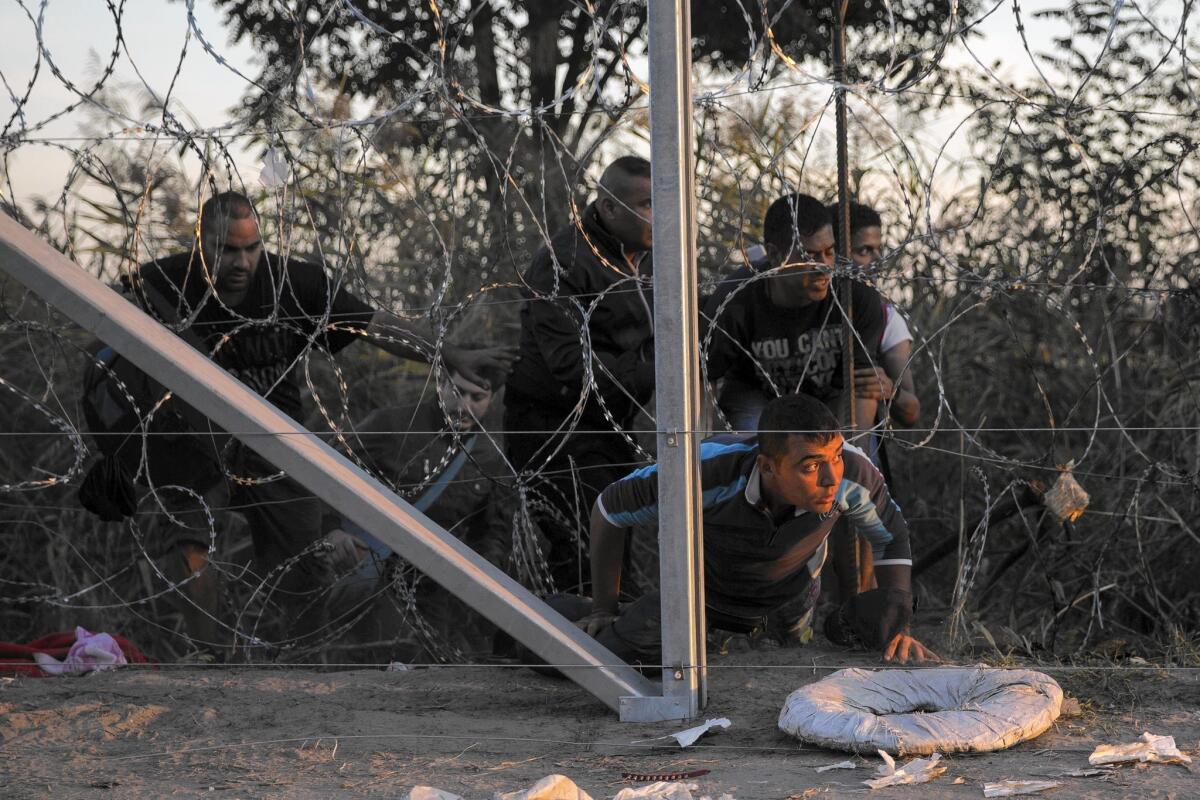Refugees crossing into Hungary seek to avoid filing for asylum there

Migrants breach a fence to cross into Hungary from Serbia. Many refugees do not wish to stay in either country.
- Share via
Reporting from Roszke, Hungary — Just inside the Hungarian border, a Syrian man named Mohamed stood on the railroad tracks he had followed from Serbia. His white sweater was dirty and worn, and his face haggard. As hundreds of people trudged past him into Hungary, he looked warily at the police awaiting them.
He, his father and his cousins hoped to make it to Northern Europe. They knew that, under European Union rules, if they walked into the camp set up by border police, they probably would have to lodge their asylum claims in Hungary instead.
“Did we escape from death in Syria to be stopped in Hungary?” said Mohamed, shaking his head. He declined to give his last name for fear of complicating his asylum claim.
“No to fingerprints,” he said. “We will escape somehow. We escaped from [the government of Bashar] Assad, we can escape these police.”
A quickly rising river of refugees and migrants is flowing into Hungary, reaching thousands per day and overwhelming the police. Conditions in the temporary detention camps on the border are miserable. And most of the new arrivals are desperate to not be registered in Hungary and are attempting to avoid police or escape from detention.
Under EU rules, once someone is registered in a member country, they might not be able to claim asylum in other nations, and few migrants want to stay in Hungary.
NEWSLETTER: Get the day’s top headlines from Times Editor Davan Maharaj >>
Hungary’s prime minister has made it clear that asylum seekers are not welcome and that the country will not ease their journey to the wealthier EU countries that are largely their destination.
But last week, after thousands of refugees stranded at Budapest’s main train station decided to walk to Vienna along a main highway, authorities broke down and sent buses to carry them to Austria. Recent arrivals are similarly determined to not stay in Hungary.
As night fell Wednesday, dozens of people who had been stopped by police in the camp near the border here refused to board the buses that would take them to temporary detention centers.
“We won’t go!” they chanted. They begged to be allowed to travel on to Austria, Germany and beyond without being registered in Hungary.
Though Hungary built a fence along its border with Serbia, it has not extended the barrier along the railroad tracks leading into Roszke, one of the most trafficked crossing points. Two Hungarian guards, wearing hospital masks, stood at the border Wednesday watching a steady stream of people cross and making no attempt to stop them.
But about half a mile inside the country, police detained the crowd, setting up an improvised camp where people waited to be sent to detention centers. There is no running water at the site, and the only food and water available are from volunteers. Families with crying children sat in the sun under the watchful eyes of police, and discarded clothes and trash were strewn over the ground.
What awaited them at the next camp was even worse, said Peter Bouckaert, emergency director at Human Rights Watch. He visited the temporary detention centers Wednesday and described the conditions as appalling.
There are no interpreters and little medical assistance available, and inadequate water and food, he said.
“The detention facilities at the border are places of hell for new arrivals,” he said. “They are herded like cattle in pens and forced to stay in the open in hot sun, where some are literally passing out from heat and exhaustion. It’s just unacceptable that people fleeing a brutal conflict are treated like this on the doorstep of Europe.”
To evade police, many were waiting on the Serbian side of the border for nightfall, hoping to sneak across the border in the dark and find their way to a nearby gas station, where taxis would take them to Budapest, the Hungarian capital, for a hefty fee.
“We’re searching for any way to get through Hungary without giving our fingerprints,” said Ninos, a 30-year-old Syrian, who, like Mohamed, was fearful about giving his last name. “We came too far to give up now.”
Chick is a special correspondent.
ALSO
U.S. faces pressure to change its strategy in Syria
Which countries are taking in Syrian refugees?
Fake weddings and a honeymoon in Vegas; dad-daughter duo arrested in green card marriage schemes
More to Read
Sign up for Essential California
The most important California stories and recommendations in your inbox every morning.
You may occasionally receive promotional content from the Los Angeles Times.










